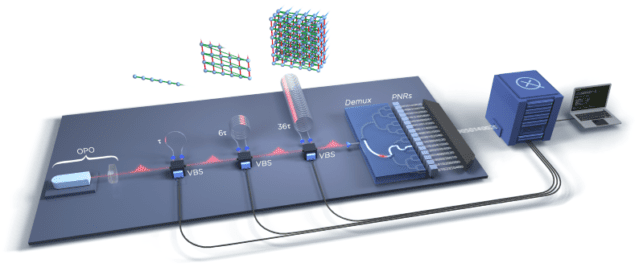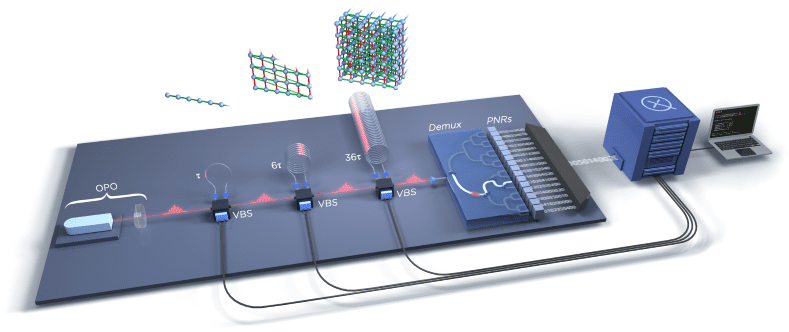
Researchers at Xanadu, a Canadian company specializing in photonic quantum computing, claim to have achieved quantum computational advantage with an experiment run on their cloud-accessible Borealis machine. The term “quantum advantage” (sometimes called quantum supremacy) refers to a situation in which a quantum machine carries out specific computational tasks that would be intractable for a classical computer. The latest experiment, which involves taking measurements that correspond to drawing a sample from a distribution, takes Xanadu’s Borealis 36 microseconds per sample, whereas the team estimate it would take 9000 years for the world’s fastest supercomputer to model the same experiment using the best known algorithms.
The task in this experiment is an example of Gaussian boson sampling (GBS) – a simplified framework for optical quantum computers in which quantum states of light are sent through an interferometer (an optical network with tunable parameters dictating how the photons interfere) before being measured at the outputs. This design is simpler than a universal quantum computer, and as Jonathan Lavoie, systems integration team lead at Xanadu, explains, it has restricted applications. “It is important to emphasize that quantum advantage machines are built with the purpose of proving something fundamental about the power of quantum computing, not necessarily to solve an immediate ‘useful’ problem,” Lavoie says. “The latter will likely require fault-tolerance and error correction.”
Building on previous quantum advantage results
Previous quantum computational advantage claims have met with some controversy. In 2019, a team at Google announced quantum advantage using superconducting (instead of photonic) technology, although this has been debated within the community. More recently, experimenters from the University of Science and Technology of China made similar claims for two experiments (also performing GBS) known as Jiuzhang and Jiuzhang 2.0. Although a considerable technological achievement, further papers raise questions about their results. Nicolás Quesada, who led the project alongside Lavoie and is now assistant professor at Polytechnique Montréal, notes that “more theory and verification tools are needed.” Quesada’s work continues to look at these verification tasks.
Borealis differs from Jiuzhang in several ways, including size: with 216 distinct modes (different accessible quantum states), Xanadu’s machine represents a significant increase from the previous record of 144. Xanadu also uses a new design for GBS that delays photons in loops of optical fibre before they interfere with subsequent pulses, which helps suppress errors and improves scalability. One particular achievement of this latest work is techniques implemented to stabilize these fibres to lengths far below the order of the wavelength of the light, as discussed in a blog post published by the team at Xanadu.
The new setup means that not all possible configurations of GBS can be carried out. “For photonics, when one wants to encode interesting problems reflective of real-world application instances, one needs access to a universal programmable interferometer, which will typically entail significant losses,” Quesada says. “So this is definitely a hard challenge.”
Borealis does, however, allow full programmability within the limits of the proposed structure, whereas previous GBS experiments of this scale had fixed interactions between modes. The additional flexibility is permitted by advances in generating quantum states of light, the detection rate, and fast electro-optical switching, which changes the settings of components at which pulses interfere at a sufficiently high speed to implement all the possible operations.

Classical computers race to catch up with quantum advantage
Borealis is unique among quantum advantage demonstrations in that the public can now access this machine and submit jobs remotely via Xanadu’s cloud service. Whether GBS produces any useful calculations beyond a demonstration of quantum advantage, however, is still uncertain. Furthermore, as Quesada explains, when it comes to the applications of GBS, further research is needed to understand “whether there are classical algorithms that can do the job well enough thus nullifying the need for quantum machines”. Nonetheless, this achievement “really helps build confidence that our hardware development and software control systems are on the right track to build a fault-tolerant photonic quantum computer at Xanadu,” Lavoie tells Physics World.
